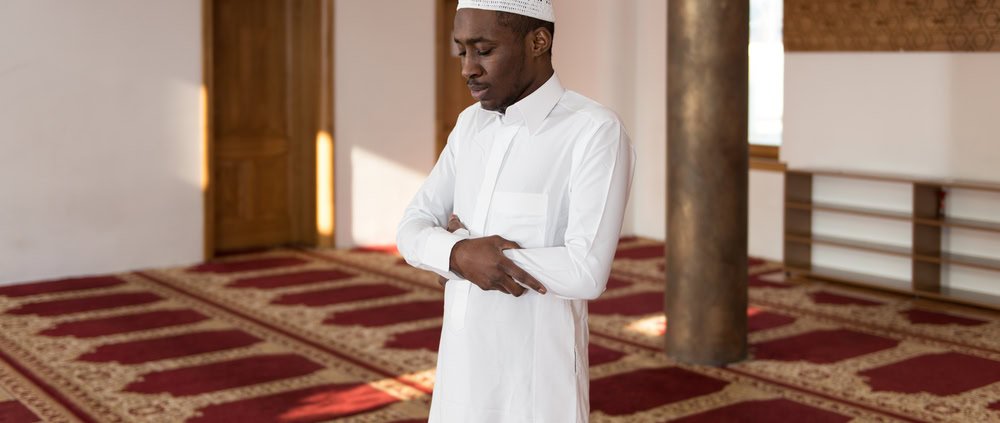Is My Prayer Invalid If I Recite Loudly in Silent Prayers?
Answered by Shaykh Khalid al-Kharsa
Question
Is my prayer invalid if I recite loudly in silent prayers?
Answer
Praise be to Allah.
It is known among Muslims that prayers are either silent or loud. The praying person whispers in the daytime prayers (Dhuhr and ‘Asr) and recites aloud in the nighttime prayers (Fajr, Maghrib, and ‘Isha).
It should be known that if a person is praying alone, they have the choice between reciting aloud or silently in the loud prayers and reciting aloud is better. If one is an Imam, reciting aloud in the loud prayers is obligatory. As for whispering in the silent prayers, it is necessary (wajib) for both the Imam and the individual praying alone, according to the Hanafi school of thought.
Suppose the Imam or an individual recites aloud in silent prayer. In that case, they have neglected a necessary act, but their prayer is still valid, and they must then perform the prostration of forgetfulness (Sujud al-Sahw).
Imam al-Haskafi said, “The individual has the choice in reciting aloud, and it is better. In silent prayers, he must whisper definitely according to the Hanafi school.” It is mentioned in al-Fath, “Where whispering is necessary for the individual, it is fitting that prostration is required by its omission.” [Ibn ‘Abidin, Radd al-Muhtar]
May the Almighty grant us an understanding of His religion and the rulings of His Shari‘a and make us among those accepted by Him.
[Shaykh] Khalid al-Kharsa
Shaykh Dr. Muhammad Khalid al-Kharsa is a distinguished scholar from Syria, born in Damascus in 1960. He holds a bachelor’s degree from the Faculty of Da‘wa Islamiyya in Tripoli, a higher diploma in Comparative Fiqh from the University of Omdurman in 1998, a master’s degree in Comparative Fiqh from the Faculty of Shari‘a and Law at the University of Omdurman in 2002, and a Ph.D. in Comparative Fiqh from the same institution in 2010.
He acquired knowledge and spiritual guidance from Shaykh Muhammad Salih al-Farfur, Shaykh Abdul Razzaq al-Halabi, Shaykh Muhammad Adib al-Kallas, and Shaykh Abdul Rahman al-Shaghouri, may Allah have mercy on them all.
He received Ijazas from several scholars, including Shaykh Muhammad Amin Siraj, Shaykh Abdul Ghani al-Daqar, Shaykh Muhammad Sa‘id al-Kahil, Shaykh Malik bin al-Arabi bin Ahmad al-Sharif al-Sanusi, Shaykh Muhammad Usman Bilal, the Mufti of Aleppo, and others.
Shaykh Khalid lived in Damascus for 52 years, where he engaged extensively in educational and social activities before being displaced from there. He moved to Istanbul at the end of 2015 and co-established “Markaz Jami‘at al-‘Ilm Wa al-Hidaya” within two months of his arrival. In Istanbul, he is active in educational roles. He serves as the director and teacher at the Sheikh Abdul Razzaq al-Halabi Institute, a lecturer at Dar al-Fuqaha, and a teacher at the Dar al-Funun Waqf.
His scholarly works and research include his tahqiq on “al-Rasa li al-Salihat min al-Nisa” by Hafiz Yusuf bin Abdul Hadi, “Adab al-Murta‘i in the Science of Dua (Supplication),” “al-Isti‘ana bi al-Fatiha,” “Rashat al-Aqlam – Explanation of Kifayat al-Ghulam” by Shaykh Abdul Ghani al-Nabulsi in Hanafi Fiqh, “al-Hada’iq al-Wardiyya fi Ajla al-Naqshbandiyya” by Khani, and “al-Arba‘in al-Tusiyya” by Muhammad bin Aslam. May Allah preserve him and make his contributions beneficial.
